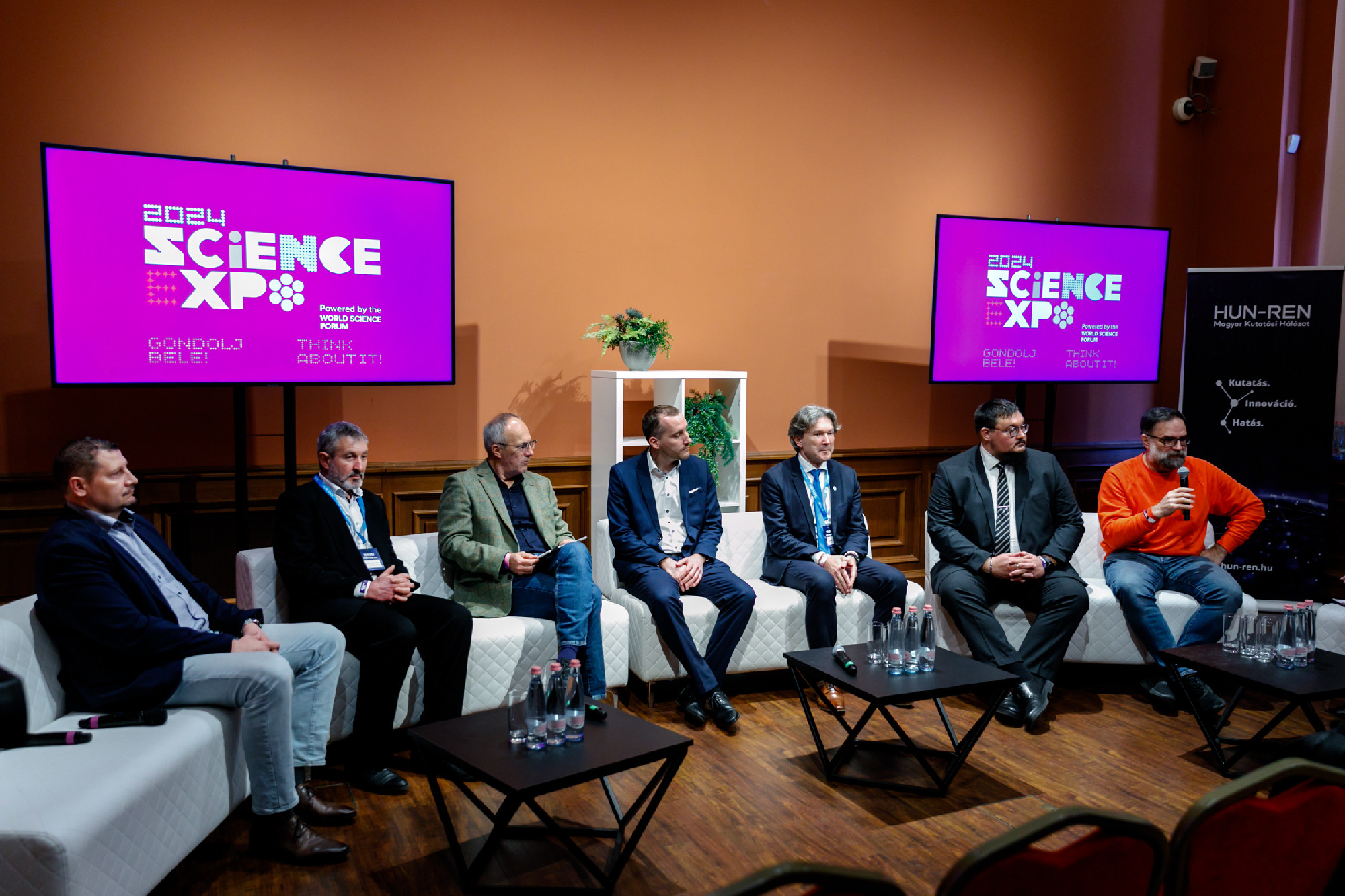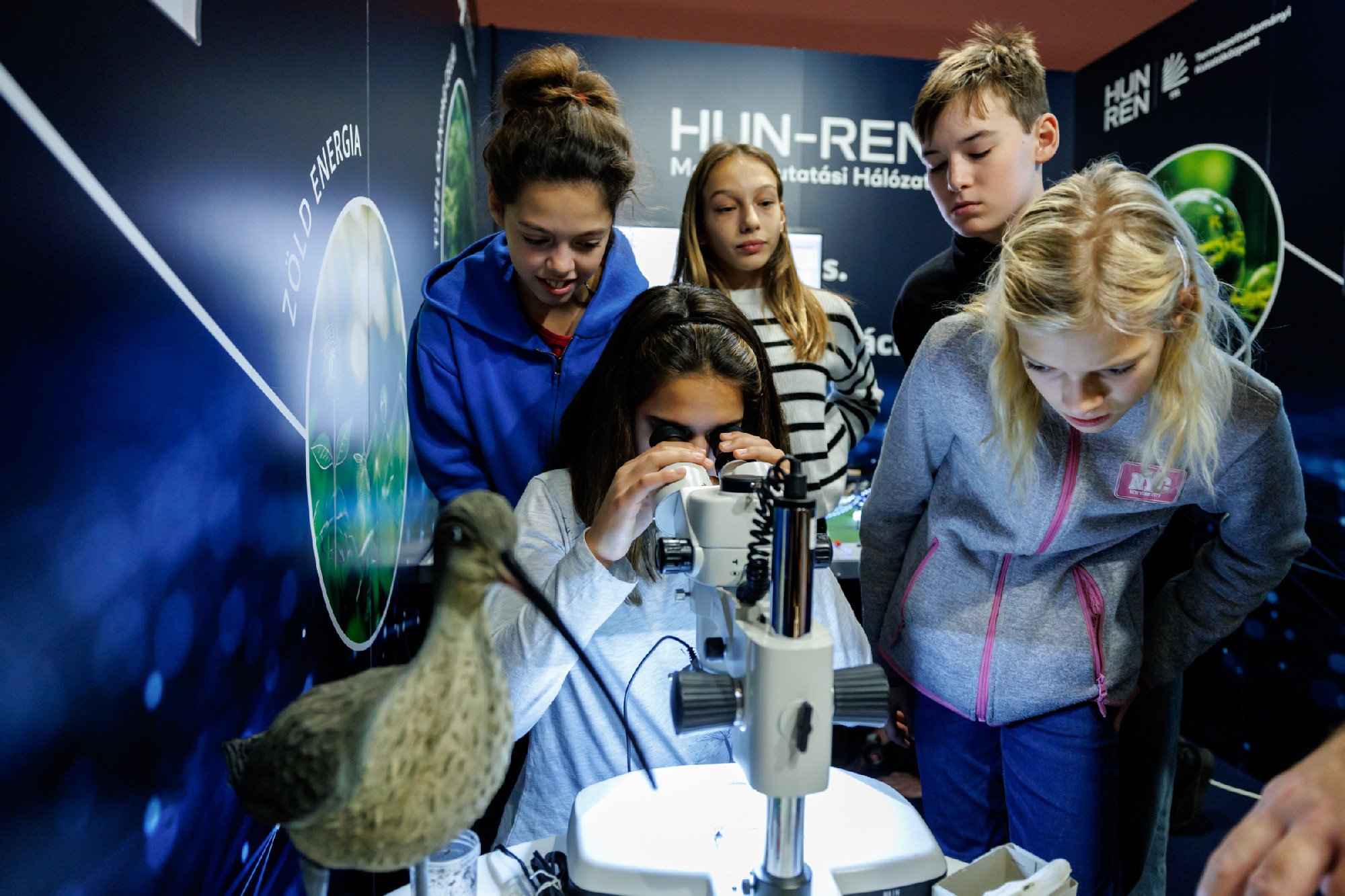A Close Encounter with Cutting-Edge Research and Researchers
At the end of November, science took center stage at the Museum of Fine Arts in Budapest. During the Science Expo, key players from Hungary's scientific community showcased their daily work through engaging exhibits, including robot dogs, stem cell research, and captivating experiments.
As part of the World Science Forum, one of the world’s most prominent science policy conferences, the Science Expo was held at the Museum of Fine Arts in Budapest from November 21–23. The spectacular exhibition showcased Hungary’s outstanding research achievements across four major disciplines - mathematics, physics, chemistry, and biology. It was designed to inspire future researchers and engage anyone with a passion for science.
In the Roman Hall of the Museum of Fine Arts, visitors explored fascinating research projects at exhibitor booths, while the main stage featured even more thrilling live experiments. For those seeking deeper and more thought-provoking content, the Schickedanz Hall hosted panel discussions on current topics, featuring experts from research institutes, universities, and the private sector.
While artificial intelligence (AI) was a recurring topic in nearly every panel discussion, one of the most popular sessions focused entirely on AI itself. Renowned experts in the field explored the ethical and legal challenges of AI use and discussed how to responsibly integrate this technology into our daily lives.

Science Expo
Photo: Marton Nagy
The panel featured diverse perspectives on artificial intelligence. While one participant described AI as the next step in evolution, suggesting it is unstoppable, another voiced concerns over the protection of personal data. Roland Jakab, CEO of HUN-REN, offered a more optimistic view. He argued that although technological progress can be temporarily slowed, the key is to find a balance that allows AI to be used reliably in specific aspects of our lives.
"AI opens up numerous new perspectives: on one hand, it accelerates certain processes, enabling faster solutions, and on the other, it creates new technologies," said Roland Jakab. He added that the biggest question is how a country can manage and facilitate the spread of artificial intelligence - what frameworks it can establish, how it can encourage its use to make businesses more competitive, and how it can leverage AI to provide greater convenience or improved services for its citizens.

Science Expo
Photo: Marton Nagy
Another panel discussion addressed the pressing challenges of climate change, and the scientific and political collaborations needed to ensure a sustainable future. László Zsolt Garamszegi, head of the HUN-REN Centre for Ecological Research, emphasized that climate change is a byproduct of human activity. Beyond altering the climate, he noted, humanity is consuming and repurposing habitats, exacerbating a biodiversity crisis, and facing pandemics - all signs that our ecological systems are also undergoing profound changes with significant impacts on us. When discussing the phenomenon of climate anxiety, Garamszegi suggested it isn’t inherently negative. While it may manifest in concerns such as "there will be fewer bananas" or "a coffee shortage," these can serve as wake-up calls, steering society toward positive change. He argued that researchers have a critical role in charting this path forward, offering alternatives and proposing solutions to facilitate the radical changes necessary for a sustainable future.
On the second day of the Science Expo, a panel discussion delved into the community-shaping roles of arts and religion before and after the advent of written language. The discussion featured two researchers from the HUN-REN Research Centre for the Humanities, Eszter Bánffy (Prehistoric Archaeology Department) and Ádám Bollók (Historical Archaeology Department). The panelists explored how rituals and traditions played a crucial role in forming communities over millennia, acting as powerful tools for strengthening identity and enhancing resilience. They also emphasized that these practices remain significant in today’s digital age, whether through shared meals or the celebration of family and religious traditions. The experts pointed out that studies show children who find meaning and answers in their everyday lives through rituals and customs are more resilient to societal challenges.
On the third day of the Science Expo, discussions once again turned to AI, this time focusing on the role of digital technologies in shaping modern networks and collaboration models. Panelists agreed on the need for regulation but warned that those who fail to embrace the advantages of digitalization risk falling behind in the race. Whether in healthcare, biology, or other fields, success will belong to the doctors, hospitals, and institutions that can keep pace with digital advancements and effectively collaborate with AI. "Thanks to AI, they will be far more efficient, faster, and more accurate," the researchers emphasized.
Beyond professional discussions, science enthusiasts were treated to a variety of exciting, almost show-like programs. One standout attraction was the 40-kilogram "Macskafogó" robot dog, developed by the HUN-REN Institute for Computer Science and Control (HUN-REN SZTAKI), which performed demonstrations outside the museum. Another highlight was the interactive model by the Bay Zoltán Research Centre, which illustrated Hungary's power supply. Visitors could simulate scenarios with and without the Paks Nuclear Power Plant to explore the nation's energy infrastructure. Researchers from the HUN-REN Centre for Natural Sciences and the Institute of Experimental Medicine showcased the journey of a drug, from its conceptual inception to the production of tablets. Visitors also had the opportunity to delve into the fascinating world of stem cells through interactive teaching systems.
The Science Expo was made possible through the collaboration of the Ministry of Culture and Innovation, the National Innovation Agency, the HUN-REN Hungarian Research Network, the Hungarian Academy of Sciences, the National Academy of Scientist Education, and the country’s leading universities.

Science Expo
Photo: Marton Nagy

